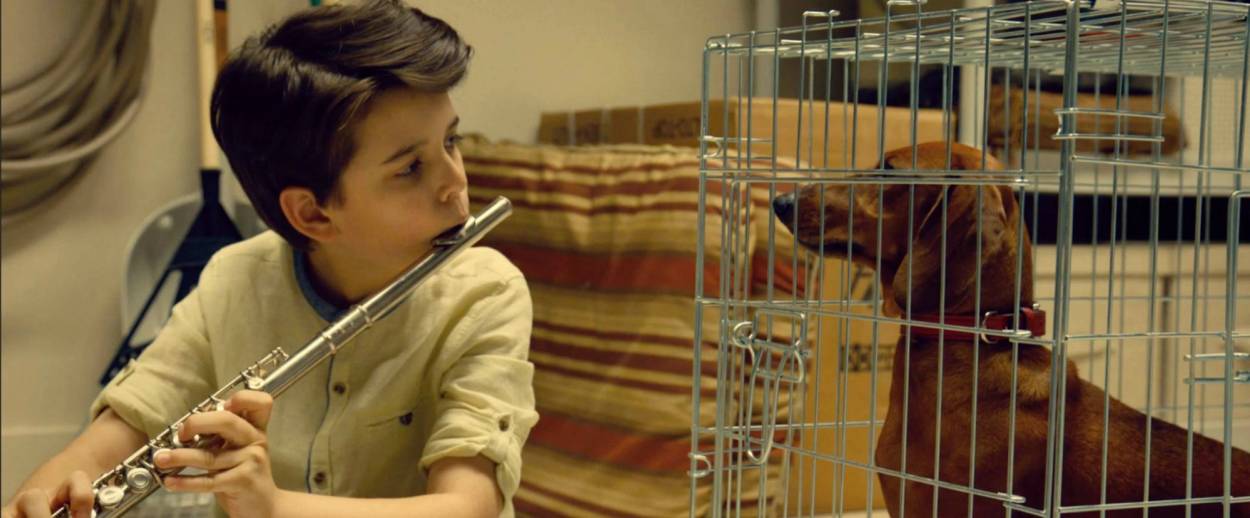‘Wiener-Dog’ Is a Brutal Trip Through American Suburbia
Director Todd Solondz’s new film centers on a long-faced dachshund who bears witness to the emptiness of her owner’s bleak lives




Todd Solondz loves to play the hits. And in Wiener-Dog, his first feature film since 2011’s Dark Horse, all the familiar themes are there: the crushing inhumanity of suburbia, the debilitating diseases, the agony of childhood, the self-deception, the random acts of violence, the transactional nature of modern relationships, and, of course, the pitch-black humor. Throw in a healthy dose of social-justice-as-accessory—one character wears an “I Can’t Breathe” shirt while she complains about a “dinosaur” of a film professor—escapist drug use, and intimacy-as-ammunition, and you’ve got yourself a Solondz film.
Wiener-Dog presents a series of vignettes held together by the titular canine, a long-faced dachshund that bears witness to the emptiness of the lives she’s a part of, however briefly. Different owners give her different names; at various points, she’s called “Cancer,” “Doody” (“Like shit?” the dog is asked, indulging the audience’s silent question), and, of course, “Wiener-Dog.”
Like few directors working today, Solondz doesn’t shy away from chances to interrogate the pathologies of characters immediately familiar to audiences. A wealthy couple (Tracy Letts and Julie Delpy) buys the dog for their in-remission son (Keaton Nigel Cooke), who immediately connects with Wiener-Dog. He tries to shield her from his father (who wants to “break the will” of the dog) and from his mother’s insistence on spaying her. Ultimately, the boy, the only one to show any love for Wiener-Dog, is the one who unwittingly serves her chocolate, setting into motion a hilarious, scatological cascade that the camera drifts over like it’s a sun-drenched vista.
There’s a barely enough time to process the unfairness of it all before we’re whisked to another world. An adult Dawn Wiener (who should be familiar to fans of Solondz’s Welcome to the Dollhouse, played here by Greta Gerwig) rescues Wiener-Dog from euthanasia, renaming her Doody. The weight of her loneliness becomes clear after a run-in with a never-better Kieran Culkin, a seemingly sadistic former schoolmate who invites her a journey that Dawn justifies by reminding herself that her town has “nothing” for her. A visit with Culkin’s happily married brother with Down Syndrome, played by Connor Long, creates more a black and white environment than Solondz typically deals in, but it also leads to a first hint of genuine connection, a nice reprieve from the film’s exhausting first half.
After a brief faux-intermission in which Wiener-Dog strolls past classic American cinematic landscapes for two minutes, we’re thrown right back in the shit, so to speak, with sad-sack film professor/screenwriter Dave Schmertz (Danny DeVito) emerging as the new owner. Schmertz’s flailing attempts at creating something “real,” compounded by a crop of unbearable students, plays out with Wiener-Dog (unnamed in this vignette) strapped to a bomb, and Schmertz’s filmmaking axiom (“What if? Then what?”) turned into a sword to fall on.
Luckily, Wiener-Dog survives that one, but the final segment one-ups the bleakness anyhow. An elderly shut-in (Ellen Burstyn) has given Wiener-Dog her final name, Cancer, much to the surprise of her distant granddaughter (Zosia Mamet) who’s dropped in for a visit. Of course, it’s never that simple with Solondz, and the Jewish grandson in me cringed as Mamet broke into tears while pleading for cash to fund her boyfriend’s Damien Hirst-knockoff art exhibition. Soon, the grandmother has a terrifying vision of her younger selves that Solondz somehow tops just a minute later with a sight gag that makes you, well, gag.
On civilization and its discontents, Wiener-Dog lands somewhere between David Cross’s unduly harsh Hits and Sam Mendes’s American Beauty in its simultaneous contempt, pity, and love for white middle class Americans fumbling through modernity. What distinguishes Solondz from, say, Alexander Payne is a distinctly Jewish humor that revels in its own darkness. While Wiener-Dog isn’t as explicitly Jewish as something like Life During Wartime, it’s hard not to see Solondz’s Dave Schmertz as a character straight out of late-period Philip Roth. (And, of course, there’s Dawn Wiener, a hellaciously awkward Jewish teen whose origins begin in Welcome to the Dollhouse.)
Buoyed by sparingly used score, Wiener-Dog allows for redemption in a way that Solondz typically disdains. That’s not to discount a parade of human incompetence that’s deeply discomforting to watch, but for Solondz, there’s an overture of tenderness that’s new for him.
Previous: 20 Years Later, a Follow-Up to ‘Welcome to the Dollhouse’
Related: Solondz’s Schlubs
Jesse Bernstein is a former Intern at Tablet.